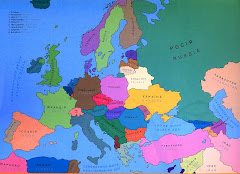



My photos don't do justice to the Carpathians of western Ukraine, but offer a few glimpses. It's the spirit of the mountains that lives with us, Tonya said, it's having been to the mountain top, having "touched the clouds." I will always remember our journey. я буду помнить наша поездка всегда. We are lucky. We are blessed. нам повезло. Мы благословенны.
This was a special journey with my Ukrainian friends Olga and Tonya, and Olga's niece Julia, from Russia ’s Ural mountains . Olga, Tonya and I had hit if off right away when I first got to Starobilsk, 16 months ago. We just liked each other instantly, and we became fast friends. I've spoken of them many times in my blogs. Olga is a retired French teacher who knows some English and is a world traveler. Tonya lives on a farm with her husband and teaches English at Korychevka Village School
We started out from Starobilsk on Thursday morning, 30 September, at 5 am. Vitaly, Luba's older son, drove us to Khargiv and from there we caught the overnight train to Slavsky (славське) in the Carpathian mountains . We met some great fellow travelers and laughed most of the way West. This Amerikanka took lots of ribbing, all in good fun. Tonya translated with drama, and that made us laugh harder. After a good night's sleep, we ate breakfast together (Ukrainians always travel with lots of food), and then we were in Slavsky.
What a lovely mountain town (какой славный горный городок), to me more like Hanover, New Hampshire, than Colorado Springs, more like a small town in the Smokies than in the Rockies. The first day was cloudy and cool, with mist on the mountain tops. We actually had perfect travel weather the whole time, sunny during the day, clear starry skies at night. We explored the town on foot, visited a beautiful golden-domed church, and took in the fresh mountain air. What joy!
The next day we took another long walk, past the church, past farms and pretty houses with flowers, through a park, past a culture center for children, to a ski resort. It's not the height of the season so there were not many people. We settled into the double ski lifts and slowly rose, up and up, to the mountain top. We stood speechless when we got there, in awe of the beauty. We had no words in any language (and between us there were four of them) to express our feelings. We just enjoyed the views and vistas, the yellows and golds and colors of fall. The spirit of the mountains, Tonya called it. On our way back to our lodge we visited a castle-turned-hotel, and enjoyed the grounds and the grandeur.
Our hosts, Galina and Nikolai Matlak, the builders and proprietors of the lodge where we stayed, were as gentle and welcoming as the mountains. It's a great lodge with reasonable rates, nice rooms with private baths, an equipped big eat-in kitchen, and access to a cooking kitchen. We ended the day with a great shaslick dinner cooked by Nicolai, with special trimmings, including mushrooms Galina herself had gathered. It was the best barbeque meal I have ever had. The best! I learned to say thank you (дякую) in Ukrainian, since this is the dominant language in western Ukraine
On day 3 in Slavsky we went to another mountain, another ski area, another chair lift. It was as beautiful as our first trip up, and this time we wandered around the grounds, had a picnic lunch, and even looked for mushrooms. We found some, were very excited, but Galina told us when we got back to the lodge that they were not the eating kind.
Day 4 of our adventure took us by a short train ride from Slavsky to the valley town of Skole (сколе) Cultural Center,
From very early times, as I understand the history, and I am still learning, from before and through the Middle Ages into the 20th century, the western part of Ukraine has been dominated by various nations--Poland, Austria , Hungary, other European tribes and invaders, the Nazis, then Russia Ukraine
At times it was like being in a different country, so different from the eastern Ukraine
In western Ukrain e estern Ukrainians are strong nationalists and patriots who strive to remember and to honor all those who fought for freedom, “freedom fighters” like Stefan Bandera and many others.
In general,too,this part of Ukraine
East and West, the Ukrainian people share many experiences and struggles, as well as many traditions and folkways. Sometimes a tension exists between them. The debate about language, not to mention the recent presidential election, symbolizes this tension. Many Ukrainians believe that a united nation will survive, while others wonder if it’s possible. The differences, they claim, are too vast. Nor does today’s political climate inspire much confidence.
“United we stand, divided we fall,” Tonya said, recalling the words of Abraham Lincoln during the American Civil War. This is the dream of many Ukrainian people today. It may take time, but I believe time is on the side of the proud and the optimistic. The Carpathian mountains hold a key to Ukraine




























No comments:
Post a Comment